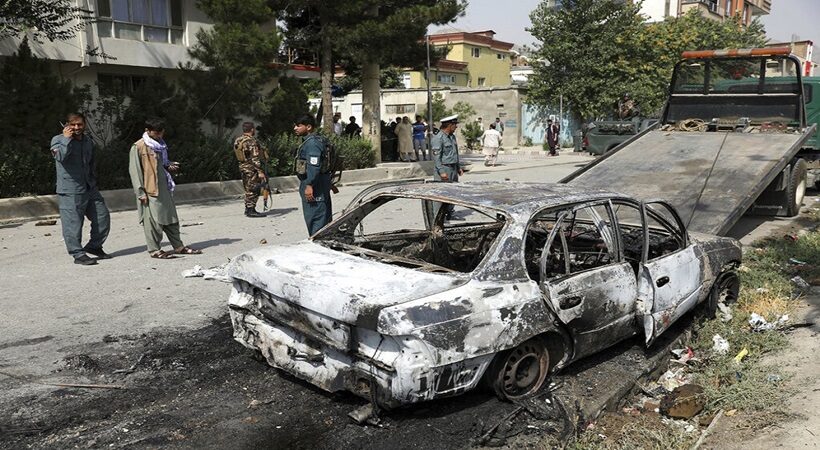India this week ruled out the immediate closure of its embassy in Afghanistan amid intense clashes with the Taliban and the deteriorating situation in Afghanistan. India confirmed that it would continue to engage with all the stakeholders to work for a comprehensive ceasefire and a political settlement.
“We are monitoring the situation very carefully, but there are no plans as such [to close the embassy],” External affairs ministry spokesperson Arindam Bagchi told a regular media briefing.
The Taliban have made rapid advances recently, including capturing nine provincial capitals and attacking Kandahar and Herat this week. These developments have sharpened security concerns in New Delhi. The government of India has planned to deal with all contingencies.
As many as 50 Indian nationals, including diplomats, left the Mazar-e-Sharif and reached New Delhi on August 11. Around 1,500 Indians were said to be still in Afghanistan.
India is also monitoring the safety of all Hindu and Sikh majority in Afghanistan. Bagchi said that India was “concerned about the deteriorating security situation in Afghanistan, adding, “Indian embassy officials in Kabul are keeping track of these minorities. We will ensure all necessary assistance to them.” He also said that “all stakeholders” in Afghanistan, which includes certain factions of the Taliban as well.
After some Taliban attacks on Sikhs last year, India had brought back 383 Sikhs and Hindus from Afghanistan.
With the clashes in Afghanistan, as many as 12 nations — including the US, China and India, and representatives of the UN and EU — have decided not to recognise any government in Afghanistan that is imposed by force. Last week, representatives from the United States and Qatar, the UN, China, Uzbekistan, Pakistan, the UK, the EU, Germany, India, Norway, Tajikistan, Turkey and Turkmenistan joined a regional conclave. They discussed how to contain the worsening security situation in Afghanistan.
In the conclave hosted by Qatar, the participants “agreed, first and foremost, that the peace process needs to be accelerated. And they also agreed, importantly, that they will not recognise any government that is imposed through military force,” State Department Spokesperson Ned Price said.
“So this is not just the United States making this point. This is not just the United States speaking with our voice. This is the international community, as you see represented in the consensus that has emerged today,” Prince said.
He further said that the consensus is on “this very simple point: any force that seeks to take control of Afghanistan with the barrel of a gun, through the barrel of a gun, will not be recognised, will not have legitimacy, will not accrue the international assistance that any such government would likely need to achieve any semblance of durability.”
“I’ve spoken just recently about the UN Security Council statement that emanated last week, where the members of the Security Council recalled Resolution 2513, reaffirmed that there is no military solution to the conflict, and declared they do not support the restoration of an Islamic emirate,” Price said.
India issued an advisory on August 12, urging its nationals to adhere to the steps announced earlier. This is the fourth advisory in less than two months.
The Indian Embassy in Afghanistan also said that the guidelines mentioned in the previous advisories are valid and must be followed.
On August 10, India had urged its nationals to leave Afghanistan on a special flight from Mazar-e-Sharif amid clashes with the Taliban.
“A special flight is leaving from Mazar-e-Sharif to New Delhi. Any Indian nationals in and around Mazar-e-Sharif are requested to leave for India in the special flight scheduled to depart late today evening,” the Indian consulate in Mazar-e-Sharif had tweeted.
Another tweet had urged the nationals to immediately share their full name, passport, number, date of expiry on a couple of WhatsApp numbers.
The embassy also urged Indian media to take necessary precautions while ground reporting, referring to the recent tragic death of photojournalist Danish Siddiqui.
The Taliban have confirmed that they had turned their sights on Mazar-e-Sharif and have launched a four-pronged attack on the city. Sheberghan to its west and Kunduz and Taloqan in the east have already been captured. Mazar-e-Sharif is the largest city in the north.
The Afghan-led, Afghan-owned and Afghan-controlled national peace and reconciliation process has gained New Delhi’s support.
In May 2021, the US-led military coalition began the pullout of its forces, which led Afghanistan’s long-running conflict to escalate quickly and dramatically. The exercise is expected to be completed before the month ends.
Across the country, the Taliban have taken control of numerous districts. As per US intelligence assessments, the country’s civilian government could fall to the terror group within months of the withdrawal of US forces.



















